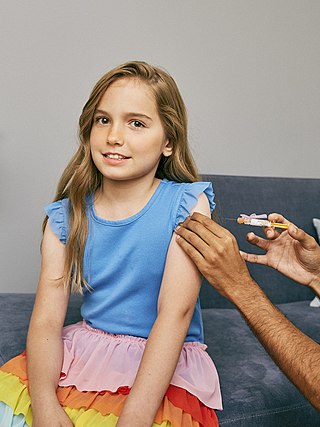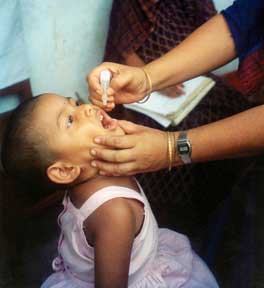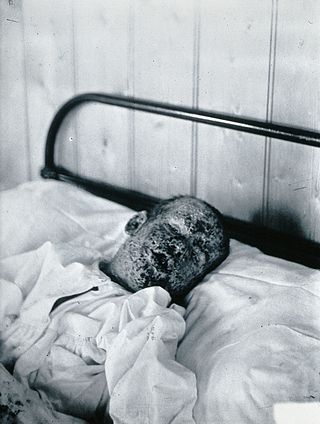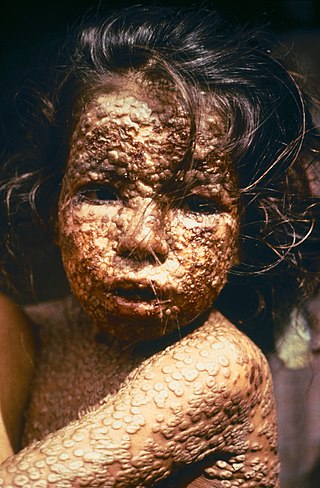Related Research Articles

Poliomyelitis, commonly shortened to polio, is an infectious disease caused by the poliovirus. Approximately 75% of cases are asymptomatic; mild symptoms which can occur include sore throat and fever; in a proportion of cases more severe symptoms develop such as headache, neck stiffness, and paresthesia. These symptoms usually pass within one or two weeks. A less common symptom is permanent paralysis, and possible death in extreme cases. Years after recovery, post-polio syndrome may occur, with a slow development of muscle weakness similar to that which the person had during the initial infection.

Vaccination is the administration of a vaccine to help the immune system develop immunity from a disease. Vaccines contain a microorganism or virus in a weakened, live or killed state, or proteins or toxins from the organism. In stimulating the body's adaptive immunity, they help prevent sickness from an infectious disease. When a sufficiently large percentage of a population has been vaccinated, herd immunity results. Herd immunity protects those who may be immunocompromised and cannot get a vaccine because even a weakened version would harm them. The effectiveness of vaccination has been widely studied and verified. Vaccination is the most effective method of preventing infectious diseases; widespread immunity due to vaccination is largely responsible for the worldwide eradication of smallpox and the elimination of diseases such as polio and tetanus from much of the world. However, some diseases, such as measles outbreaks in America, have seen rising cases due to relatively low vaccination rates in the 2010s – attributed, in part, to vaccine hesitancy. According to the World Health Organization, vaccination prevents 3.5–5 million deaths per year.

The smallpox vaccine is the first vaccine to have been developed against a contagious disease. In 1796, British physician Edward Jenner demonstrated that an infection with the relatively mild cowpox virus conferred immunity against the deadly smallpox virus. Cowpox served as a natural vaccine until the modern smallpox vaccine emerged in the 20th century. From 1958 to 1977, the World Health Organization (WHO) conducted a global vaccination campaign that eradicated smallpox, making it the only human disease to be eradicated. Although routine smallpox vaccination is no longer performed on the general public, the vaccine is still being produced to guard against bioterrorism, biological warfare, and mpox.

Polio vaccines are vaccines used to prevent poliomyelitis (polio). Two types are used: an inactivated poliovirus given by injection (IPV) and a weakened poliovirus given by mouth (OPV). The World Health Organization (WHO) recommends all children be fully vaccinated against polio. The two vaccines have eliminated polio from most of the world, and reduced the number of cases reported each year from an estimated 350,000 in 1988 to 33 in 2018.

The Pan American Health Organization (PAHO) is a specialized agency of the United Nations (UN) in charge of international health cooperation in the Americas. It fosters technical cooperation among member countries to fight communicable and noncommunicable diseases, strengthen health systems, and respond to emergencies and disasters.
Donald Pinkston Francis is an American physician and epidemiologist who worked on the Ebola outbreak in Africa in the late 1970s, and as an HIV/AIDS researcher. He retired from the U.S. Public Health Service in 1992, after 21 years of service. He lives in San Francisco, California.

Rahima Banu Begum is the last known person to have been infected with naturally occurring Variola major smallpox, the more deadly variety of the disease.

Ali Maow Maalin was a Somali hospital cook and health worker from Merca who is the last person known to have been infected with naturally occurring Variola minor smallpox. He was diagnosed with the disease in October 1977 and made a full recovery. Although he had many contacts, none of them developed the disease, and an aggressive containment campaign was successful in preventing an outbreak. Smallpox was declared to have been eradicated globally by the World Health Organization (WHO) two years later. Maalin was subsequently involved in the successful poliomyelitis eradication campaign in Somalia, and he died of malaria while carrying out polio vaccinations after the re-emergence of the poliovirus in 2013.

Polio eradication, the goal of permanent global cessation of circulation of the poliovirus and hence elimination of the poliomyelitis (polio) it causes, is the aim of a multinational public health effort begun in 1988, led by the World Health Organization (WHO), the United Nations Children's Fund (UNICEF) and the Rotary Foundation. These organizations, along with the U.S. Centers for Disease Control and Prevention (CDC) and The Gates Foundation, have spearheaded the campaign through the Global Polio Eradication Initiative (GPEI). Successful eradication of infectious diseases has been achieved twice before, with smallpox in humans and rinderpest in ruminants.
Mass vaccination is a public policy effort to vaccinate a large number of people, possibly the entire population of the world or of a country or region, within a short period of time. This policy may be directed during a pandemic, when there is a localized outbreak or scare of a disease for which a vaccine exists, or when a new vaccine is invented.

The eradication of infectious diseases is the reduction of the prevalence of an infectious disease in the global host population to zero.

Smallpox was an infectious disease caused by variola virus, which belongs to the genus Orthopoxvirus. The last naturally occurring case was diagnosed in October 1977, and the World Health Organization (WHO) certified the global eradication of the disease in 1980, making smallpox the only human disease to have been eradicated to date.
This page is a timeline of global health, including major conferences, interventions, cures, and crises.

The Global Polio Eradication Initiative is an initiative created in 1988, just after the World Health Assembly resolved to eradicate the disease poliomyelitis. Led by the World Health Organization, it is the largest international public health initiative in history.
Isao Arita was a Japanese physician, virologist and vaccination specialist who headed the World Health Organization (WHO) Smallpox Eradication Unit in 1977–85. During this period, smallpox became the first infectious disease of humans to be eradicated globally. He and his colleagues were awarded the Japan Prize in 1988 for this work. He also advised the successful programme to eradicate poliovirus from the Western Pacific region.
The World Health Organization (WHO) created the Global Commission for the Certification of the Eradication of Poliomyelitis in 1995 to independently verify the eradication of wild poliovirus. The GCC certified the worldwide eradication of indigenous wild poliovirus type 2 on 20 September 2015, and wild poliovirus type 3 on 17 October 2019. In addition, five of the six World Health Organization Regions certified their status as free of indigenous transmission of all three serotypes of wild poliovirus :
Alasdair Macintosh Geddes was a British medical doctor who was Professor of Infection at the University of Birmingham Medical School. In 1978, as the World Health Organization (WHO) was shortly to announce that the world's last case of smallpox had occurred a year earlier in Somalia, Geddes diagnosed a British woman with the disease in Birmingham, England. She was found to be the index case of the outbreak and became the world's last reported fatality due to the disease, five years after he had gained experience on the frontline of the WHO's smallpox eradication programme in Bangladesh in 1973.
Vaccination requirements for international travel are the aspect of vaccination policy that concerns the movement of people across borders. Countries around the world require travellers departing to other countries, or arriving from other countries, to be vaccinated against certain infectious diseases in order to prevent epidemics. At border checks, these travellers are required to show proof of vaccination against specific diseases; the most widely used vaccination record is the International Certificate of Vaccination or Prophylaxis. Some countries require information about a passenger's vaccination status in a passenger locator form.

The John Snow Society (JSS), founded 1992, is a learned society named for the English physician John Snow. It publishes the newsletter Broad Sheet, and hosts the Pumphandle Lecture at the London School of Hygiene and Tropical Medicine. The John Snow pub in Soho, London, serves as its meeting place.

The Pumphandle Lecture, established in 1993, is an annual lecture held around September to celebrate the removal of the Broad Street pump handle that took place in September 1854 during the cholera epidemic in Soho. It is organised by the John Snow Society, named for John Snow, and takes place at the London School of Hygiene and Tropical Medicine.
References
- ↑ Foster, Stanley O.; Hughes, Kenneth; Tarantola, Daniel; Glasser, John W. (December 2011). "Smallpox eradication in Bangladesh, 1972–1976". Vaccine. 29: D22-9. doi:10.1016/j.vaccine.2011.06.081. PMC 5723923 . PMID 22188934.
- ↑ Keywood, Sean. "Nick's got the beating of Himalayan balsam plant". Exmouth Journal. Archived from the original on 28 October 2023. Retrieved 28 October 2023.
- ↑ Pallen, Mark (2018). "24. Bangladesh 1973". The Last Days of Smallpox; Tragedy in Birmingham. pp. 71–73. ISBN 9781980455226.
- ↑ Henderson, D. A. (2009). Smallpox: The Death of a Disease: The Inside Story of Eradicating a Worldwide Killer. Prometheus Books. p. 32. ISBN 978-1-59102-722-5.
- ↑ Goodfield (1985). Quest for the Killers. Birkhäuser. p. 203. ISBN 978-0-8176-3313-4.
- ↑ "1993 Dr Nick Ward: Global Polio Eradication- a call for action". The John Snow Society. 9 September 1993. Retrieved 11 September 2020.
- ↑ Bartlett, Karen (2017). The Health of Nations: The Campaign to End Polio and Eradicate Epidemic Diseases. Oneworld Publications. p. 61. ISBN 978-1-78607-069-2.
- ↑ "Certification of Poliomyelitis Eradication". Fifteenth meeting of the European Regional Certification Commission Copenhagen, 19–21 June 2002, p. 25
- ↑ "1993 Dr Nick Ward: Global Polio Eradication- a call for action". The John Snow Society. 9 September 1993. Archived from the original on 26 October 2023. Retrieved 26 October 2023.